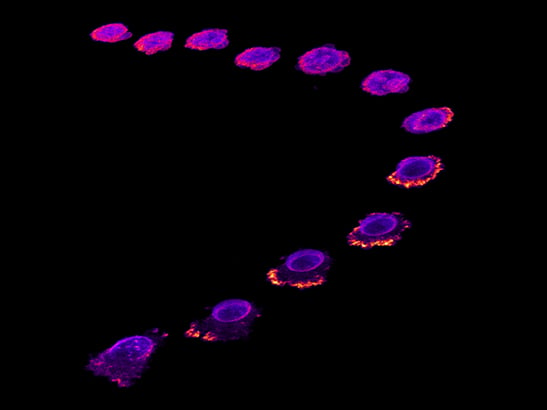
Image: breast cancer cells invading through a layer of fibroblasts.
Younger women who have recently had a child may have a higher risk of breast cancer than that of women of the same age have not given birth.
Previous research has often found that childbirth is protective against breast cancer, so these findings may seem contrasting. But researchers say that, whilst childbirth still does become protective, it can take more than two decades for benefits to emerge.
Breast cancer is more common in older women, with the average age at diagnosis being 62 in the United States. Researchers who led the study from the Premenopausal Breast Cancer Collaborative Group showed that there is a higher risk of breast cancer after childbirth in women younger than 55.
The study, which was co-led by researchers at The Institute of Cancer Research, London, and the UNC Lineberger Comprehensive Cancer Center in the US and was funded by Breast Cancer Now, was published today (Monday) in the journal Annals of Internal Medicine.
Data from 889,944 women
Other studies have shown an increase in breast cancer risk in younger women after childbirth, but have not had access to information about other factors that might impact risk, such as breastfeeding or family history of breast cancer.
The researchers pooled data from 889,944 women who took part in 15 prospective studies from around the world, which showed an increase in breast cancer risk in younger women after childbirth.
In addition to looking at breast cancer risk after childbirth, they also examined the impact of other factors, such as breastfeeding and a family history of breast cancer – information which previous studies have not have access to.
They found that, in women 55 years and younger, breast cancer risk peaked about five years after they gave birth, with risk for mothers 80 percent higher compared with women who did not give birth.
The increased risk shortly after childbirth was higher for women who also had a family history of breast cancer, who had a greater number of births or were older at first birth – but was not impacted by whether the mother breastfed or not.
Our latest research shows that within the next decade, we can make acute lymphoblastic leukaemia preventable. Your support will help us make this disease a thing of the past.
Findings not the same for all younger women
While breast cancer risk increased for mothers after pregnancy, researchers noted that the overall risk of breast cancer is still low in this group. The researchers also found that the risk was higher for women who had their first child after 35, but did not change in those who had their first child before 25.
Additionally, it was not until 23 years after giving birth that the women’s risk of developing breast cancer reduced, and the pregnancy started to become protective.
But whilst the pregnancy did become protective against oestrogen receptor-positive breast cancer years later, it did not become protective for oestrogen receptor-negative breast cancer during the study.
The findings of this study could lead to greater breast cancer awareness among young mothers and medical providers and could even be used to develop better breast cancer risk prediction models to help inform screening decisions and prevention strategies.
Findings may help 'predict individual's risk of breast cancer'
Dr Minouk Schoemaker, Staff Scientist at The Institute of Cancer Research, London, who co-authored the study, said:
“Pregnancy affects breast cancer risk in complex and different ways, and some of the causes of breast cancer appear to be different in women depending on whether they have undergone the menopause or not. However, previous research has suggested that pregnancy increases the risk of breast cancer in the short-term despite a protective effect in the long-term.
“Our large international study has provided further evidence that pregnancy increases women’s risk of breast cancer at first – although the overall rates in the younger age groups that we looked at was still low.
“And the protective effect of pregnancy on breast cancer risk becomes apparent later on, with women having a lower risk of developing the disease from around 24 years after childbirth, depending on their age at first birth and the number of births.
“We do not yet know why pregnancy affects breast cancer risk but we hope our findings will help better predict individual women’s risk of breast cancer, and increase breast cancer awareness in young mothers.”
Traditional risk factors not always same at younger ages
Dr Hazel B. Nichols, a professor in the UNC Gillings School of Global Public Health Department of Epidemiology at UNC Lineberger, said:
“What most people know is that women who have children tend to have lower breast cancer risk than women who have not had children, but that really comes from what breast cancer looks like for women in their 60s and beyond.
“We found that it can take more than 20 years for childbirth to become protective for breast cancer, and that before that, breast cancer risk was higher in women who had recently had a child.
“The risk of developing breast cancer is still low overall, even if you've had a child five years ago. We need to recognize that the traditional risk factors for breast cancer do not always operate the same way at younger ages. We want women and their doctors to not assume that recently having a child is always protective for breast cancer.”
